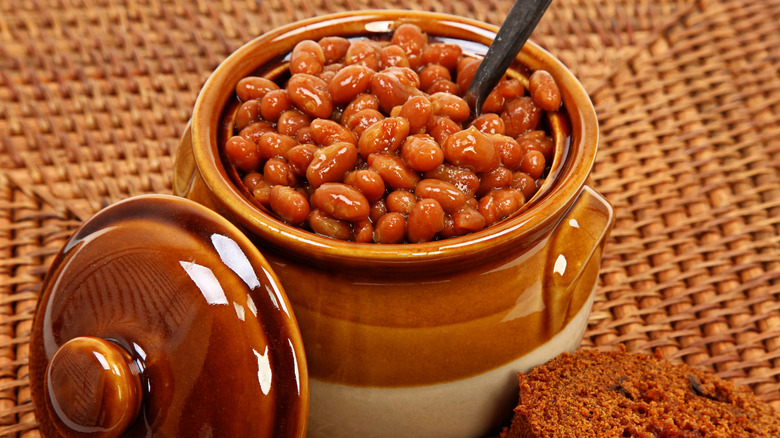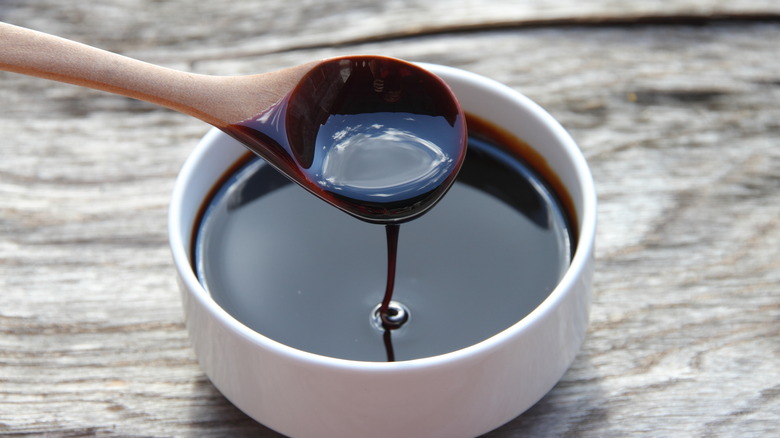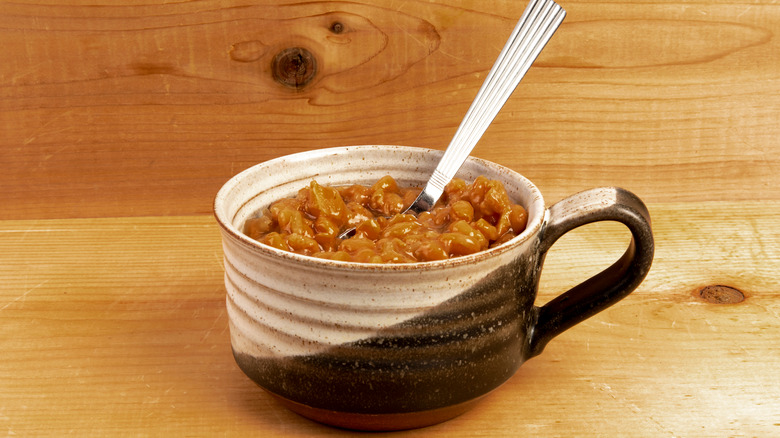Here's What Makes Boston Baked Beans Stand Out From The Rest
The humble baked bean is a behind-the-scenes star of the casual culinary world. It complements heaping plates of barbecue, graces the burger-and-hot-dog-centered menus of backyard picnics and parties, and holds together hearty winter meals meant to warm and fill you up. Baked beans are a staple. Even among the many regional styles of baked beans, though, one is set apart as a paragon. However, it's not set apart for a long and contested history (which it has), nor set apart for a popularity that went so far as to bestow a whole city with the nickname "Beantown" (it's got that too) — no, Boston baked beans stand out for their unique flavor.
Most baked bean recipes are salty, rich, and savory, but Boston baked beans have their own complexity. In the best Boston baked beans recipe, you'll find navy beans (also called haricot and Boston beans), bacon, mustard, and spices, among other things, but there's one distinguishing ingredient — molasses.
Molasses, a thick syrup made from sugar cane or beet juice, is used to make candy, add sweetness to baked goods or savory dishes, and is used to make rum. Mixed into Boston baked beans, molasses adds a mouthwatering sweetness to the savory ingredients, turning the recipe from functionally nutritious to fantastic. Like many centuries-old recipes, though, that's only the start of the conversation.
A brief history of baked beans in Boston
Actually, being brief will be difficult — because the true history of baked beans is disputed. Some trace it to England, linking modern baked beans to bean-and-bacon dishes from the Middle Ages. Others say the roots are Indigenous, with Indigenous people in North America teaching the Pilgrims a baked bean recipe using bear fat and maple syrup. There's also a theory that it comes from a traditional dish out of North Africa and Spain, and still another says Boston baked beans specifically were the result of a conscious effort in the 19th century to create a New England culinary heritage.
Regardless of who invented baked beans as a concept and when they actually sprung into being, though, Boston probably started adding molasses to its recipe in the mid-18th century. This was a result of the triangular trade, a network linking the Americas, Europe, and Africa through goods and enslaved peoples. Because of this trade network, molasses started being imported into Boston from the Caribbean in abundance — not because anyone was that devoted to baked bean flavor but because Boston was a rum exporter (in which molasses is a key ingredient).
Molasses was bountiful because of the rum trade, so much so that a 2.3 million gallon tank of molasses once took over Boston, disastrously flooding the streets of North End in 1919. Even so, molasses was key to the beans, too, and by the late 19th century, the recipe was ratified by the published cookbooks of Fannie Farmer and Mary Johnson Lincoln. The rest is history.
From Boston to Beantown
All right, not quite — because there's more. Boston latched on to this molasses-laden baked bean recipe with quite a force, and the triangular trade route that brought Bostonians the sweet syrup might also have been responsible for the city's now-infamous nickname, "Beantown." Some historians say that the moniker was the word-of-mouth result of sailors and merchants traveling the trade route, who would eat the baked beans as a cheap, filling meal.
Because baked bean history is stewed in controversy, though, that's not the only nickname origin story. When Boston played host to a Civil War veterans convention, attendees were given bean pots as a parting gift from a local pottery company. The legend goes that when the veterans were asked about the pots, they would say they got them from "bean town."
Even later, in 1907, it could have been the fault of an advertising campaign for an event called Old Home Week, which used bean pots on posters and flyers — the local Boston tourism industry joined in the fun with bean-themed slogans, which could have sprouted Beantown. No matter where the molasses came from nor how the city got its nickname, though, the sweet and savory Boston baked beans have gone down in history.


